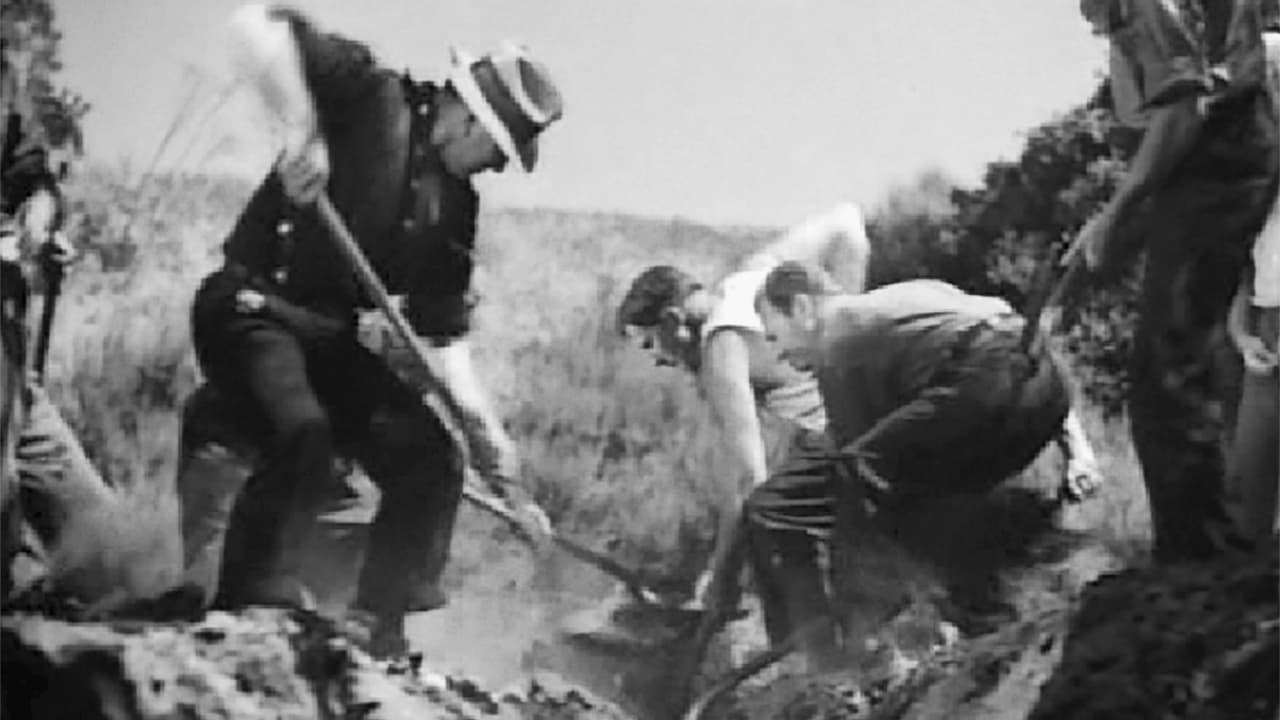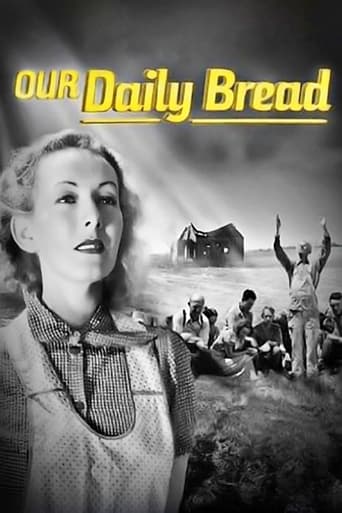

What a waste of my time!!!
... View MoreThis movie was so-so. It had it's moments, but wasn't the greatest.
... View MoreClever and entertaining enough to recommend even to members of the 1%
... View MoreThe film creates a perfect balance between action and depth of basic needs, in the midst of an infertile atmosphere.
... View MoreI like it that one reviewer likened this to a Rooney/Garland musical, for it really is, even including the big "production number" for a finale! I showed it to my American lit class today as part of our discussion of naturalism. I could have picked other, better films, but this fit neatly into the 75 min. period. Anyway, it got some applause at the end! There are obviously Soviet-style overtones, especially in the photography and editing of the final sequence, but the film is also explicitly Christian and pro-private ownership (John retains the deed to the farm). What saddens me is that the "survivalists" of today are mainly concerned with their own bug-out-dug-outs and stashing them with goods for their immediate families but no one else.Despite its naiveté and occasional bad acting (Tom Keene?) it remains an entertaining period film and instructive as well. John Qualen. He was so great in so many movies, including The Grapes of Wrath!
... View MoreToo bad the movie's laudable message gets dragged down by bad acting. That's been the traditional rap on this Depression era film, and critics are correct. Tom Keene's Golly, Gee Whiz! performance seems tailor made for Andy Hardy's older brother, but not for the embattled head of a farm co-operative. No doubt, director Vidor wanted a fresh faced non- celebrity for the inspirational role of Tom, but he should have kept auditioning before settling on Keene-- and what was Vidor seeing when he viewed the daily rushes which he likely did. The part requires an actor of Henry Fonda's calibre to bring off the various mood changes. Unfortunately Keene treats those scenes like a sulking teenager. Then too, the normally competent Addison Richards overplays the hostile stranger to a fault, which doesn't help. Fortunately, the winsome and polished Karen Morley has a featured part that anchors the rest of the cast. Nonetheless, I can see why Vidor was driven to make the film. Depression era audiences needed reminding that they could re-establish their livelihoods by combining skills instead of waiting for the financial markets to get their act together. After all, our daily bread ultimately depends not on the money changers or financial firms, but on cooperative labor working to keep production going for mutual benefit. Here, ordinary people are shown as having the necessary skills of farming, carpentry, care-giving, and the other know-how's necessary to sustaining a community. It's these folks and these skills that we can't do without when the economic chips are down. Note especially how the cooperative farm has no need for money in order to exchange goods and services. Then, no less than now, people are led to believe that no economy can function without money in some form, no doubt a comforting thought to the private bankers of the world. The movie however, shows that cooperation, not competition or money, is the ultimate background from which other economic forms develop.The fact that the cooperative farm had to reach into the money economy in order to survive only shows that their cooperative is still too small, and not that the idea won't work on a larger scale. I expect Vidor's effort was not favorably reviewed on Wall Street. It doesn't help the movie's down-to-earth message to sentimentalize plain folk as the script too often does. There's too much of the "happy peasant" atmosphere at times to be believable. (Note also how even the cheerless Addison Richard's criminal past is reformed by productive labor before he makes his sacrifice.) Nonetheless, I'd like to know where Vidor got his very ordinary looking people who don't even look like standard film "extras'-- a real boost to the movie's theme. Note too, how quickly the 4th of July rhetoric about "immortal democracy" is dismissed by the refugees as being the cause of their problems and not the solution. That's certainly an unexpected point to ponder. The fact, however, that they turn decision-making over to a single individual may be a naive reflection of developments in European fascism at a time when Germany and Italy were turning to strongmen as their solution. All in all, this is one of the more thought-provoking movies to emerge out of that turbulent period. Then too, its message is no less important now than it was then. For all that apparently aimless rolling in the mud at movie's end is more than just an expression of unbounded joy. It's a near-religious communion with the rich moist earth from which we spring and on whose bounty we still depend. For the basic fact is that mother earth and those who work it continue to feed, shelter, and clothe the rest of us, no matter how far the movies, TV and super-slick celebrities may remove us from that homely truth. Thanks, King Vidor, for the celebration and the much needed reminder.
... View More"Our daily bread" is some kind of follow-up to "The Crowd" (1928).Not only there is not work in the city anymore on account of the economy,but city is evil ,as temptress Sally shows.I love the way King Vidor tackled the subject : the society's rejects's plight after the Depression.He never loses his sense of humour ,even in the most dramatic scenes: John Sims trades his small guitar for a scrawny chicken,the farm is sold for 1.85 dollars ,etc"Our daily bread" is the new society in miniature Jim built with a little help from his pals .Every human being counts,a violin player is as useful as a carpenter.Politic is not much talked about;the word "socialism" is uttered once or twice ,but the keyword is " cooperative" ."Let's stand together" is their motto.It culminates in the last sequence,one of the strongest of all time !Songs,prayers,a bit of utopia but a lot of human warmth and love!Like this ?Try these ..."le Belle Equipe" Julien Duvivier 1936"Grapes of Wrath" John Ford 1940
... View MoreHeard my grandparents speak about the depression and how hard it was to live in any big city trying to find work and food. This film clearly shows in great detail all the difficulties people experienced trying to find work and hold a job and turned their ambitions into the rich farmland of the Mid-West. King Vidor showed the poor conditions that people had to live in and how the weather seemed to work against them with droughts and dust storms. The scene I liked the most was when all the men decided to do something about getting water for their corn crops and working day and night to get their corn fields filled with water. Some of the people jumped and rolled in the dirt, mud and went simply crazy at the sight of water flowing on their land. This was a great realistic film about the depression days years ago.
... View More